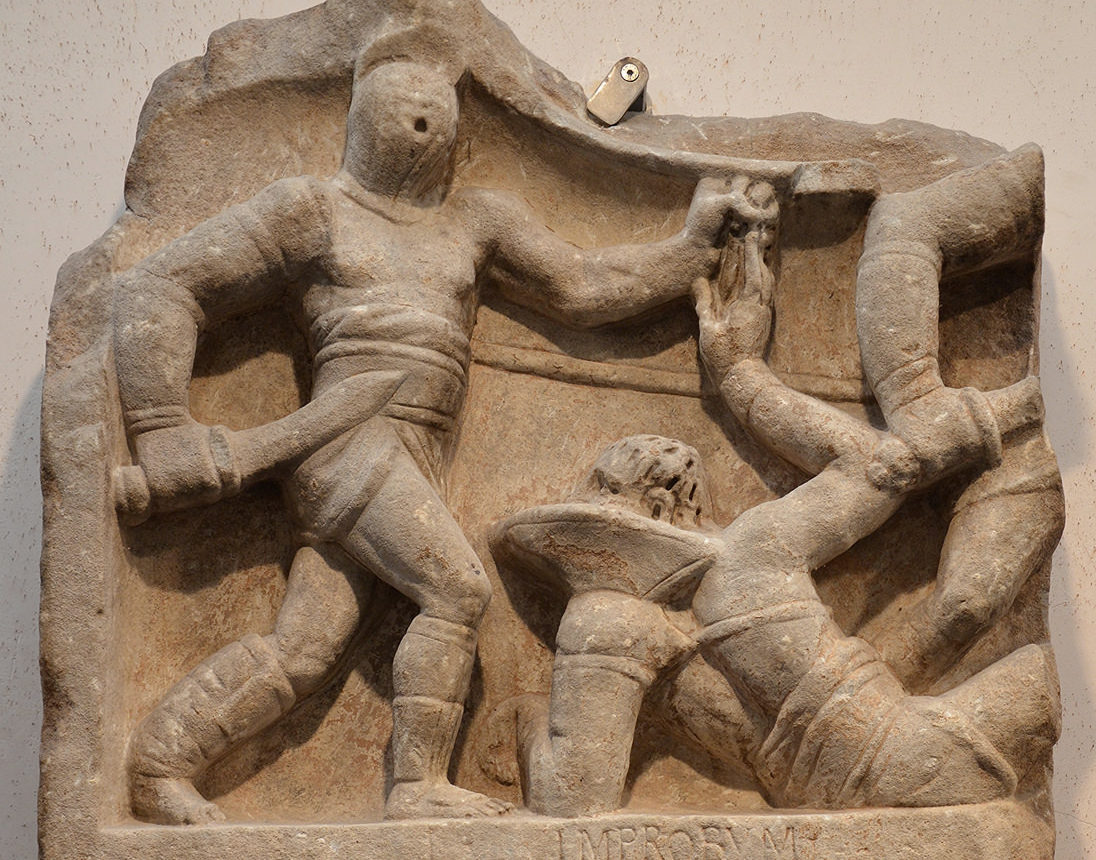Bravery in the Face of Death: Gladiatorial Games and Those Who Watched Them
By Samuel Low-Chapman
Hirundo, Vol.13 (2014-15)
Introduction: The gladiatorial games – often portrayed in modern media as brutish spectacles enjoyed by bloodthirsty crowds — were rather a rule-bound sport focused on the Roman ideal of bravery in the face of death. Wildly entertaining, the games were a popular venue for the Roman people, and played an important role within the political structure of republican and imperial Rome. This paper intends to examine why the games were so popular; to reveal the way in which Romans viewed gladiators themselves; and to demonstrate that the games were technical and skill-based, not pure blood sport. It will discuss the contradictions and ambivalent attitudes of the Romans towards the gladiators and explain why this was the case.
It is difficult to give a comprehensive and accurate account of what the gladiatorial games meant to the Romans due to the ever-evolving social and political climate that existed over the long lifespan of the games. The first games were held in Rome in 264 B.C.E., but they did not gain great popularity until the late Republican Period. Their attractiveness greatly increased through the Imperial Period, from which most of the secondary source material used in this essay originates.

 This paper will draw on multiple ancient sources from different time periods that both laud and decry the games and the gladiators in an effort to gain a basic understanding of what the games truly were and subsequently represented to the Romans. Sources examined include Tertullian, Seneca, Cicero, and Livy, amongst others. Tertullian was a Christian writing around the year 200 C.E. He was critical of the gladiatorial games, so we must view his statements under that light. Similarly, Seneca—writing in the first century C.E.—saw himself as an elite above the base pleasures of the common people, and therefore his descriptions of the games are usually negative. Cicero, a politician and orator in the late Republican Period, expressed ambivalent view towards gladiators, at times using the term as an insult and at others lauding their bravery. Livy’s historical accounts are only sometimes accurate; although we must consult his statements with scrutiny, for this paper’s purposes, his description of the pleasures of the gladiatorial games can be used to supplement other primary evidence.
This paper will draw on multiple ancient sources from different time periods that both laud and decry the games and the gladiators in an effort to gain a basic understanding of what the games truly were and subsequently represented to the Romans. Sources examined include Tertullian, Seneca, Cicero, and Livy, amongst others. Tertullian was a Christian writing around the year 200 C.E. He was critical of the gladiatorial games, so we must view his statements under that light. Similarly, Seneca—writing in the first century C.E.—saw himself as an elite above the base pleasures of the common people, and therefore his descriptions of the games are usually negative. Cicero, a politician and orator in the late Republican Period, expressed ambivalent view towards gladiators, at times using the term as an insult and at others lauding their bravery. Livy’s historical accounts are only sometimes accurate; although we must consult his statements with scrutiny, for this paper’s purposes, his description of the pleasures of the gladiatorial games can be used to supplement other primary evidence.
Click here to read this article from McGill University
Sponsored Content


Bravery in the Face of Death: Gladiatorial Games and Those Who Watched Them
By Samuel Low-Chapman
Hirundo, Vol.13 (2014-15)
Introduction: The gladiatorial games – often portrayed in modern media as brutish spectacles enjoyed by bloodthirsty crowds — were rather a rule-bound sport focused on the Roman ideal of bravery in the face of death. Wildly entertaining, the games were a popular venue for the Roman people, and played an important role within the political structure of republican and imperial Rome. This paper intends to examine why the games were so popular; to reveal the way in which Romans viewed gladiators themselves; and to demonstrate that the games were technical and skill-based, not pure blood sport. It will discuss the contradictions and ambivalent attitudes of the Romans towards the gladiators and explain why this was the case.
It is difficult to give a comprehensive and accurate account of what the gladiatorial games meant to the Romans due to the ever-evolving social and political climate that existed over the long lifespan of the games. The first games were held in Rome in 264 B.C.E., but they did not gain great popularity until the late Republican Period. Their attractiveness greatly increased through the Imperial Period, from which most of the secondary source material used in this essay originates.
Click here to read this article from McGill University
Sponsored Content